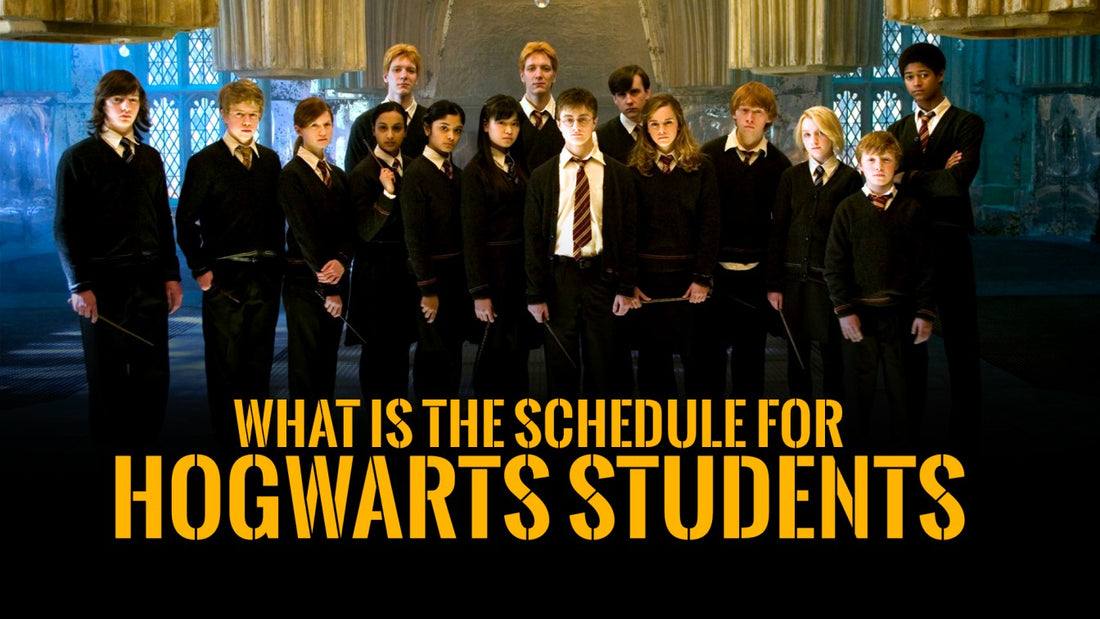
What is the Schedule for Hogwarts Students?
Share
Lots of people read the Harry Potter books or watch the Harry Potter series around the world. In the United States alone, more than 50% of people aged between 30 and 44 are familiar with Harry Potter through books or films. Hogwarts has become one of the most recognizable literary icons.
So, what would it feel like to be a Hogwarts student? What kind of a schedule would one have to follow? Is the schedule fixed? Let’s take a sneak peek at the fully packed schedule of future wizards. Who knows, maybe, you like it so much that you’ll consider enrolling in the school?!
The Start Of The School Year At Hogwarts
The school year at Hogwarts, just like any other normal school, starts on the first of September. Students ride Hogwarts Express from King’s Cross Station. The express departs at 11:00 a.m. and arrives at Hogsmeade Station.
All students in their years 2 to 7 ride horseless carriages to the castle. First-year students have the advantage of sailing across the lake in boats with Hagrid. The day culminates in the start-of-the-year feast with the Sorting, Dumbledore’s opening remarks, and a wide selection of food and drinks.
Classes Begin
Classes really start on the 2nd of September. Students get detailed schedules during breakfast. Throughout the year, there are several important dates to remember:
- Halloween Feast on 31 October, with a flurry of bats and pumpkin treats.
- Quidditch match in early November.
- End of term a week before Christmas.
- Christmas Feast on 25 December.
- Second term soon after 1 January.
- Exams in early June.
- Results in mid-June.
- Leaving Feast the evening before the Hogwarts Express returns to London in late June.
As classes begin, students start thinking about ways in which they can ease their academic workloads. For once, there is no need to resort to wizardry. Many use the best essays helper to complete their assignments on time and to the best academic standards.
Daily Schedule
The daily schedule looks like this from Monday through Friday:
- 06:30 a.m. - 08:30 a.m.: Breakfast
- 09:00 a.m. - 12:00 p.m.: Classes
- 12:00 p.m. - 01:00 p.m.: Lunch
- 01:00 p.m. - 04:00 p.m.: Classes
- 06:00 p.m. - 08:00 p.m.: Dinner
- 09:00 p.m. - 06:00 a.m.: Curfew
There are no classes on Saturday and Sunday. The library is open from 07:00 a.m. to 08:30 from Monday through Friday and from 09:00 a.m. to 08:00 p.m. on Saturday and Sunday.
Alternative Daily Routine
As befits the school of wizards, here is an alternative routine for students. I leave it to you to figure out how students would go about choosing the schedule that worked best for them.
- First things first. The day starts with a delicious breakfast in the Great Hall. It is then that the morning mail arrives at the school. Seconds before 09:00 a.m., the bell rings to summon students to classrooms.
- Students attend two classes in the morning. They are separated by a break. A lunch break follows.
- Afternoon classes start at 01:00 p.m. I am still trying to figure out whether students attend one of two classes in the afternoon. Maybe, you can help to glean this information from the mysterious school records?
- Students have supper in the Great Hall in the evening. They can then relax in their House common rooms. This is the time for studying or socializing. This is also when they work to improve their writing habit and other important skills. Curfew starts from 09:00 p.m.
- It is up to the students to decide when to hit the sack.
Finishing Touches
Hogwarts enchants both students as well as Harry Potter fans. It has become a symbol of wizardry, mystery, and magic. Only naive students would think the school schedule would be straightforward and fixed.
They have to be both smart and creative about picking the ‘real’ schedule and following it in earnest. As with everything else, the schedule can be fluid and subject to change. Life is full of challenges, even for wizards.
***
Andrew Mazur is a longtime writer, literary critic, and researcher. He has built his reputation by posting regular reviews of the masterpieces of American and British literature. As a researcher, Andrew has carried out numerous research projects focusing on the relationship between art and academic performance.

1 comment
Realy Missing Hagrid!!!
Condolence May His soul Rest in peace.